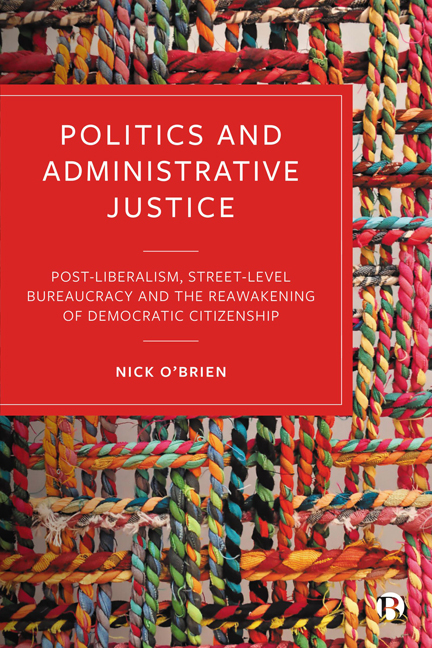 Politics and Administrative Justice
Politics and Administrative Justice Book contents
- Frontmatter
- Dedication
- Contents
- About the Author
- Acknowledgements
- 1 Introduction
- 2 Street-Level Bureaucracy and the Response to Citizen Grievance
- 3 The ‘Social Imaginary’ of Liberal Legalism
- 4 The Promise of Postliberalism
- 5 Citizen Grievance and the Spectre of Legalism
- 6 Postliberal Accountability: The Challenge of Disability Human Rights
- 7 Responding to Grievance: Mental Health and Special Educational Needs and Disability
- 8 Postliberal Administrative Justice
- 9 Conclusion
- References
- Index
7 - Responding to Grievance: Mental Health and Special Educational Needs and Disability
Published online by Cambridge University Press: 27 March 2024
- Frontmatter
- Dedication
- Contents
- About the Author
- Acknowledgements
- 1 Introduction
- 2 Street-Level Bureaucracy and the Response to Citizen Grievance
- 3 The ‘Social Imaginary’ of Liberal Legalism
- 4 The Promise of Postliberalism
- 5 Citizen Grievance and the Spectre of Legalism
- 6 Postliberal Accountability: The Challenge of Disability Human Rights
- 7 Responding to Grievance: Mental Health and Special Educational Needs and Disability
- 8 Postliberal Administrative Justice
- 9 Conclusion
- References
- Index
Summary
The emergence and consolidation of disability as an indispensable aspect of public philosophy and a catalyst of a new paradigm not just in equality law but in public law more generally provide a fresh and urgent opening for the revival of responsive legality as the defining framework for administrative justice. Yet just as the responsive and incipiently postliberal initiatives in Britain in the interwar and immediate postwar years foundered on the obduracy of restricted, autonomous and legalistic modes of legality, so the ability of a revived responsiveness to exercise its transformative alchemy is diminished by the lure of legalism and the risk of acquiescence in its hegemony. The tension between autonomous and responsive legalities can be illustrated by the way in which citizen grievance is accommodated in the separate but related mental health and special educational needs systems in England. Attention will focus on tribunals and public ombuds as twin institutional centres, before turning to a form of civic mediation which might provide a template for future procedural development.
The ‘mental health’ context
Mental distress and disability rights: from medicalism to legalism
The situations of those experiencing ‘mental distress’ or ‘psycho-social impairment’ were latecomers to the disability rights movement, commonly associated in its early phases with mobility and sensory impairment. The depiction of a wheelchair-user as the readily identifiable symbol of disability access is a recognizable legacy of that emphasis. Although the UN Convention on the Rights of Persons with Disabilities (CRPD) explicitly includes those with psycho-social impairment within its scope, thereby acknowledging the extension of disability rights beyond the categories of mobility and sensory impairment, the recruitment of those experiencing mental distress to the ranks of ‘disabled people’ has not been without controversy (Spandler et al, 2015). Nevertheless, in the context of the modern history of responses to mental distress, the accession of psycho-social impairment to the disability rights fold has been heralded as largely progressive, as an emancipatory journey from ‘patient to citizen’ (Sayce, 2000, 2016).
That history is readily disclosed by the waxing and waning of state control within a shape-shifting legal framework, frequently characterized as expressing preferences for ‘medicalism’ or for ‘legalism’, respectively, as defining approaches.
- Type
- Chapter
- Information
- Politics and Administrative JusticePostliberalism, Street-Level Bureaucracy and the Reawakening of Democratic Citizenship, pp. 88 - 103Publisher: Bristol University PressPrint publication year: 2023


